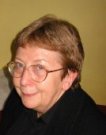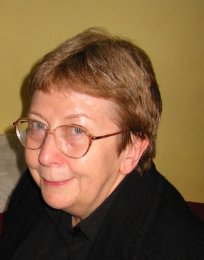AUSTRALIAN POETS AT WORK SERIES 1
Jennifer Strauss
Selected by Coral Hull

[Above] Photo of Jennifer Strauss by Elke Suhr, 2001.
CH: Where is your favourite place and why?
JS: A beach, preferably an ocean beach in winter, where, without the distractions of summer, I can contemplate the spaces of sea and sky and be at peace with my own (relative) insignificance. In Devon recently I saw a wonderful beach warning sign that said "The sea is not a swimming-pool" - that's what I like about it.
CH: Name a piece of visual art that has truly touched you.
JS: Just one? Francis Gruber's "The Red Divan" and Gershon Iskowitz's Holocaust paintings moved me to poetry; almost any Cezanne landscape can charm me into a deep stillness; and an exhibition in Prague of drawings by the children of the Theriesenstadt concentration camp moved me to tears.
CH: What is the hardest thing you've ever had to do?
JS: To tell my three children, aged 18, 14 and 10, that the father they had breakfasted with had died of a heart attack later that morning, and to tell my mother-in-law that she had lost her only child.
CH: Who are your favourite Australian writers?
JS: Not what you'd call an homogenous group. Judith Wright, Gwen Harwood, Patrick White and Christina Stead are first and canonical enough loves; then, higgledy-piggledy, Thea Astley, Drusilla Modjeska, John Forbes, Peter Carey, Fay Zwicky, John Scott, Jordie Albiston, Jennifer Harrison and the occasional one-off book like The Ballad of Siddy Church, The Mule's Foal, Romulus My Father, Mr Darwin's Shooter. Ask me another day and the list might change.
CH: What are your primary concerns regarding the world?
JS: "Man's inhumanity to man" (war, poverty, cruelty, indifference) in the general sense (i.e. including all human beings under the generic term "man" as in "mankind"); Australia's treatment of refugees; the stalling of advances in justice for Indigenous Australians; Humanity's abuse of the environment; Abuse world-wide of women and children;
America's superpowerdom (and the prospect of China's).
CH: What did you want to be when you grew up?
JS: Anything that would let me go on reading books.
CH: Why is poetry important to you?
JS: Because I know no other language that can speak at once for heart and head, dream and reality, chaos and form. And because, in my life, it is a crucial balance to the language of political activism.
CH: If you could do lunch with anyone who would it be?
JS: My father, back from the dead and free of deafness, so that we could have the conversations we never had in his lifetime and I could ask the questions that I didn't know then that I needed to ask. (Maybe he wouldn't want to answer, but that's another story).
| |
Stains
Red rain out of the north.
While I sit in a Land Rights meeting
It marks my shiny car
With the broken dreams
Of the Mallee's soldier settlers -
Or does it blow, this dust,
From somewhere further back -
From out of that red centre
The broken hearts
Of the first dispossessed?
My car's an urban upstart,
A little water clears it of this deed.
Some stains are not so easily dispersed.
Living in English
Living in English seemed natural as breathing,
even when schooled to languages
where breath
must move in different ways
to pass the necessary impedimenta
transforming it to speech.
(How safe the Latinate abstraction
Anglo-Saxon tongue,
teeth, lips - any of these
might conjure up the phantom of your body
that merely tolerates such names).
Eighteen years it took
to recognise the English poetry I loved
was an imperfect medium
for the natural air I breathed;
years more of labouring
towards reconciliation.
Knowing this, how could I dream so stubbornly,
so long, there'd be no reckoning,
no day
when breath that mingled -
wild or quiet -
so sweetly in the dark
would summon lovers back
to the waking glare
of separate languages;
when what had joined us would put asunder.
The Stone Lovers
(In a local Aboriginal legend, "Julian's rocks", standing offshore
in Byron Bay, are two lovers turned to stone by the gods because
their relationship breached totemic taboos)
How the stories devour them,
those crazy lovers who cannot understand
that coupling is a social function.
Let Love once pipe "Am I not enough?"
and they'll dance across all proper borders,
forsaking land and language, god and clan,
to drown in one another's eyes.
Sometimes the music falters-
a point the moralists are keen to make-
So Irish Cathleen peaks and pines
in brash New York
though Helen's home to boring Sparta.
Don Jose turns killer, Antony spills
his Roman blood on Egypt's sand,
and mad Medea flaunts her slaughtered sons.
Yet still the lovers cry
"Am not I enough? Am I not your world?"
And sometimes Death or the gods
look gravely on these human antics:
"You'd be like us, sufficient? Come then,
We'll make you mythical". Romeo and Juliet,
Tristan and Iseult - never again apart;
and the stone lovers, face to face,
transformed, transfixed.
Is it enough?
Do the lovers hear
at night, at the witching hour,
a fugitive whisper in the passing waves-
slip-slapping or crashing,
caressing or drenching?
Is it Yes they say or No . . .
Yes or No . . .
Yes?
Country Town
Doing my bit against the holiday toll
I 'break the drive'
Eat a tired sandwich, take a walk
In the Gardens by the creek
Where roses battle gallantly
Against the assault of wind, the sun's fire.
Paused at the stone cenotaph
To pay respects to those we promised
Their names would not grow old,
My idling eye stalls on one name:
Cameron, Cameron, and again
Cameron.
Think of the unrelenting telegrams
Killed in action, Died of wounds,
Missing, believed dead.
Perhaps they were only cousins.
Not even the one family - Cameron,
It's a name common enough -
But not listed
Among the town's dead in World War Two.
Did the clan die with them?
Or did the family pack up and move away
Away from memories of toy soldiers,
Football matches, and all the days
They came home, safe, from school.
Acknowledgments: Kunapipi (Australia), The Victorian Association for the Teaching of English (Australia). |
About the Poet Jennifer Strauss

|
Jennifer Strauss was born on a dairy farm near Heywood, and spent the first six years of her life there. She received her education successively in a Catholic convent, Presbyterian boarding school, and Anglican College of Melbourne University. Her working life has been as an academic in English departments, which has afforded her a great deal of pleasure from teaching, and the chance to move about the world a good deal - living in Britain, USA, Germany, Canada and travelling in Spain and Latin America, especially Argentina. Her first published poems were in Melbourne University Magazine. As an academic at Monash University, Jennifer published a good deal of literary criticism, including books on Judith Wright and Gwen Harwood; edited 2 anthologies of Australian poetry, and co-edited The Oxford Literary History of Australia. Jennifer is national President of a women's NGO, the Australian Federation of University Women. |
[Above] Photo of Jennifer Strauss by Elke Suhr, 2001.
I Next I
Back I
Exit I
Thylazine No.3 (March, 2001) |



